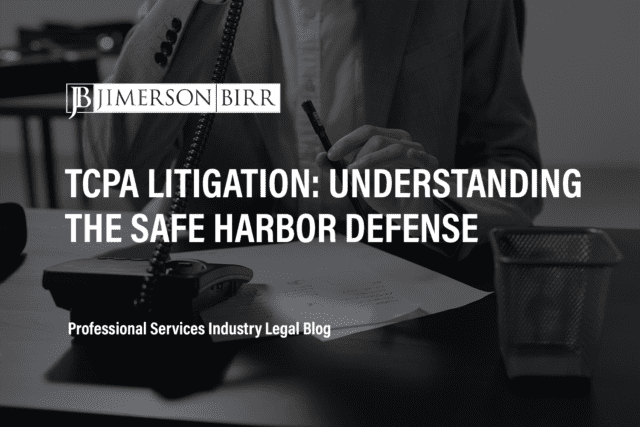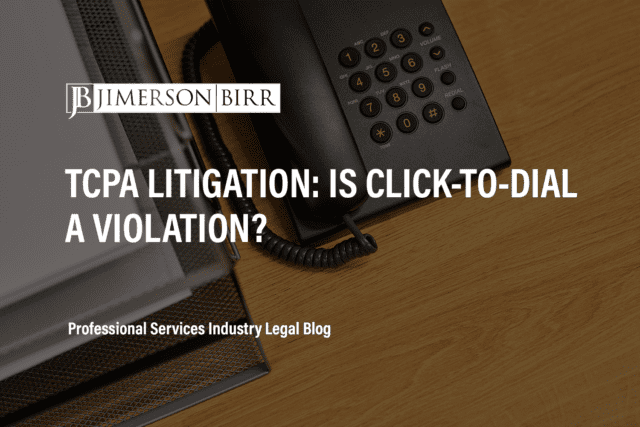What do challenging allegations and limiting exposure for damages entail?
Challenging allegations and limiting exposure for damages are essential aspects of defending against TCPA (Telephone Consumer Protection Act) claims in Florida. These defensive strategies focus on disputing the plaintiff’s assertions and minimizing potential financial penalties. In the context of TCPA defense litigation, they encompass various legal arguments and tactics tailored to the specific circumstances of each case.
One example of challenging allegations is disputing the plaintiff’s claim that the defendant used an automatic telephone dialing system (ATDS) to make unsolicited calls. Under the TCPA, using an ATDS is crucial for establishing liability. In the case Facebook, Inc. v. Duguid, the Supreme Court clarified the definition of an ATDS, providing a basis for defendants to challenge allegations in situations where their dialing systems do not meet the legal requirements.
Need help defending against a class action? Schedule your consultation today with a top class action litigation defense attorney.
What are the strategic benefits of challenging allegations and limiting exposure for damages?
Challenging allegations and limiting exposure for damages offers the following strategic benefits:
- Case dismissal: Successfully disputing the plaintiff’s claims could lead to the dismissal of the case, saving the defendant from potential financial penalties and protecting their reputation.
- Reduced damages: By limiting exposure for damages, defendants can minimize the financial impact of a potential adverse judgment, mitigating the overall cost of litigation.
- Stronger negotiating position: Effectively challenging allegations and demonstrating the plaintiff’s lack of evidence can leverage settlement negotiations, potentially leading to a more favorable outcome for the defendant.
- Setting legal precedents: In some cases, a successful defense can establish new legal precedents or clarify existing laws, providing guidance for future litigation and helping to shape TCPA enforcement.
- Deterrence: A proactive and aggressive defense strategy may deter potential plaintiffs from bringing similar claims in the future, as they may be less confident in their ability to prevail in court.
What steps can class action defendants take to challenge allegations and limit exposure for damages?
Defense counsel should consider the following:
- Thoroughly review the complaint: Analyze the allegations and identify any weaknesses or inconsistencies in the plaintiff’s claims. Ensure a proper understanding of the applicable TCPA provisions and relevant Florida statutes.
- Investigate the facts: Gather evidence to refute the plaintiff’s claims, such as call records, consent forms, and internal policies for telemarketing practices.
- Research legal precedents: Examine recent federal and Florida cases, such as Facebook, Inc. v. Duguid, to identify circumstantially-applicable, successful defense strategies and arguments.
- File pretrial motions: Prepare and file motions to dismiss, motions for summary judgment, or other pretrial motions that could result in the case’s dismissal or limit the scope of the plaintiff’s claims.
- Develop affirmative defenses: Build a strong defense based on applicable legal theories, such as consent, good faith defense, or lack of ATDS usage, and be prepared to present evidence to support these defenses at trial.
- Engage in settlement negotiations: If appropriate, explore the possibility of settling with the plaintiff. Use the strengths of the defense and weaknesses in the plaintiff’s case to negotiate favorable terms.
When a set of facts is appropriate to meet the litigation requirements, there are many paths a claimant may take. We are value-based attorneys at Jimerson Birr, which means we look at each action with our clients from the point of view of costs and benefits while reducing liability. Then, based on our client’s objectives, we chart a path to seek appropriate remedies.
To determine whether your unique situation may necessitate litigation, please contact our office to set up your initial consultation.
Frequently Asked Questions
- How does the definition of an auto-dialer affect TCPA defense litigation in Florida?
The definition of an “auto-dialer” is a critical factor in TCPA defense litigation. In the Facebook, Inc. v. Duguid case, the Supreme Court clarified that an auto-dialer must be able to generate random or sequential phone numbers and dial them. This decision narrows the scope of potential TCPA violations and can be a strong defense argument if a defendant’s equipment does not meet this definition.
- Can a business be held liable for TCPA violations committed by a third-party telemarketer?
Yes, a business can be liable for TCPA violations committed by third-party telemarketers if they are acting on the business’s behalf. Therefore, under the FCC’s guidance, companies must ensure that third-party telemarketers comply with the TCPA requirements. In addition, businesses should establish proper oversight, implement policies and procedures, and maintain records of telemarketing practices to minimize liability.
- What are the potential penalties for TCPA violations in Florida?
The penalties for TCPA violations can be significant. For example, under federal law, penalties range from $500 to $1,500 per violation, depending on whether the violation was willful or negligent. Additionally, under the Florida Consumer Collection Practices Act (FCCPA), which covers some telemarketing practices, a violator may be liable for actual damages, statutory damages up to $1,000, and attorney’s fees. Therefore, businesses need to implement measures to ensure compliance and avoid these potential penalties.
Have more questions about a class action defense-related situation?
Crucially, this overview of challenging allegations and limiting exposure for damages does not begin to cover all the laws implicated by this issue or the factors that may compel the application of such laws. Every case is unique, and the laws can produce different outcomes depending on the individual circumstances.
Jimerson Birr attorneys guide our clients to help make informed decisions while ensuring their rights are respected and protected. Our lawyers are highly trained and experienced in the nuances of the law, so they can accurately interpret statutes and case law and holistically prepare individuals or companies for their legal endeavors. Through this intense personal investment and advocacy, our lawyers will help resolve the issue’s complicated legal problems efficiently and effectively.
Having a Jimerson Birr attorney on your side means securing a team of seasoned, multi-dimensional, cross-functional legal professionals. Whether it is a transaction, an operational issue, a regulatory challenge, or a contested legal predicament that may require court intervention, we remain a tireless advocate every step of the way. Being a value-added law firm means putting the client at the forefront of everything we do. We use our experience to help our clients navigate even the most complex problems and come out the other side triumphant.
If you want to understand your case, the merits of your claim or defense, potential monetary awards, or the amount of exposure you face, you should speak with a qualified Jimerson Birr lawyer. Our experienced team of attorneys is here to help. Call Jimerson Birr at (904) 389-0050 or use the contact form to set up a consultation.

We live by our 7 Superior Service Commitments
- Conferring Client-Defined Value
- Efficient and Cost-Effective
- Accessibility
- Delivering an Experience While Delivering Results
- Meaningful and Enduring Partnership
- Exceptional Communication Based Upon Listening
- Accountability to Goals











